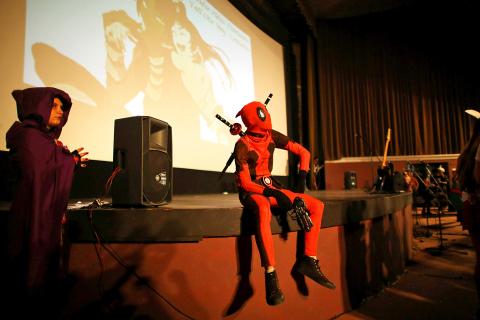Cuba may be one of the world’s least connected countries but that is not stopping the Japanese subculture of animated movies, manga comics and video games from spreading feverishly among its youth.
More than a thousand “Otakus,” or fans of such fantasy worlds, descended on Havana this week for the country’s third Otaku festival, defying the sweltering heat to sport the costumes of their favorite characters.
Some performed scenes from animation movies on stage, while others belted out songs in Japanese with Spanish subtitles projected in the background. Still others did role playing dance choreographies. A prize was awarded for best cosplay, or role playing in costume, and for best manga drawing.

Photo: REUTERS/Alexandre Meneghini
“Every day, the Otaku community is growing in this country,” said festival participant Juliette Fernandez, who was dressed up as the digital pop princess Hatsune Miku with turquoise pigtails down to her thighs.
The 17-year old, who is learning Japanese and dreams of creating comics, said she started getting seriously into the subculture a year ago.
“We started making the costumes, finding the wigs, designing choreographies and even trying to imitate the characters’ voices,” said Fernandez, whose Otaku group will perform a concert in September.
Some Cubans said the role playing offered them an escape and the science fiction heroes encouraged them to overcome their own difficulties.
“The anime heroes are people we can identify with, who have problems but manage to overcome them,” said Yoel Pagola, 24.
Otakus face challenges pursuing their hobby in Cuba. Internet access in the Communist-ruled island is restricted, meaning fans can not easily look up series and mangas on the Web.
“It’s really thanks to ‘El Paquete’ that we’re able to watch anime here,” said participant Jose Cruz, 20, referring to packages of media on USB sticks that can be purchased across Cuba each week.
Cruz, dressed up as anime pirate Trafalgar Law, said he took a 12-hour bus from the eastern city of Holguin to attend the festival.
Accessories are not on sale in Cuba so Otakus make their own costumes, saving up for the materials.
“It took me four months to make this costume in my spare time,” said Fernando Gonzales, 20, sweating heavily under his full fake suit of armor.
“Between the cardboard, the paint and the glue, it cost a fair bit, so I’m hoping to win the cosplay.”

June 9 to June 15 A photo of two men riding trendy high-wheel Penny-Farthing bicycles past a Qing Dynasty gate aptly captures the essence of Taipei in 1897 — a newly colonized city on the cusp of great change. The Japanese began making significant modifications to the cityscape in 1899, tearing down Qing-era structures, widening boulevards and installing Western-style infrastructure and buildings. The photographer, Minosuke Imamura, only spent a year in Taiwan as a cartographer for the governor-general’s office, but he left behind a treasure trove of 130 images showing life at the onset of Japanese rule, spanning July 1897 to

One of the most important gripes that Taiwanese have about the Democratic Progressive Party (DPP) is that it has failed to deliver concretely on higher wages, housing prices and other bread-and-butter issues. The parallel complaint is that the DPP cares only about glamor issues, such as removing markers of Chinese Nationalist Party (KMT) colonialism by renaming them, or what the KMT codes as “de-Sinification.” Once again, as a critical election looms, the DPP is presenting evidence for that charge. The KMT was quick to jump on the recent proposal of the Ministry of the Interior (MOI) to rename roads that symbolize

In an interview posted online by United Daily News (UDN) on May 26, current Chinese Nationalist Party (KMT) Chairman Eric Chu (朱立倫) was asked about Taichung Mayor Lu Shiow-yen (盧秀燕) replacing him as party chair. Though not yet officially running, by the customs of Taiwan politics, Lu has been signalling she is both running for party chair and to be the party’s 2028 presidential candidate. She told an international media outlet that she was considering a run. She also gave a speech in Keelung on national priorities and foreign affairs. For details, see the May 23 edition of this column,

On the evening of June 1, Control Yuan Secretary-General Lee Chun-yi (李俊俋) apologized and resigned in disgrace. His crime was instructing his driver to use a Control Yuan vehicle to transport his dog to a pet grooming salon. The Control Yuan is the government branch that investigates, audits and impeaches government officials for, among other things, misuse of government funds, so his misuse of a government vehicle was highly inappropriate. If this story were told to anyone living in the golden era of swaggering gangsters, flashy nouveau riche businessmen, and corrupt “black gold” politics of the 1980s and 1990s, they would have laughed.